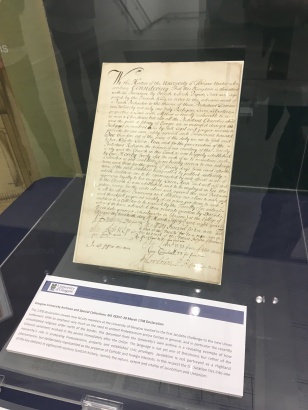 The fifth ‘Historical Conversations’ event was held on 5 December 2017 with Prof. Allan Macinnes (University of Strathclyde), Prof. Murray Pittock (University of Glasgow) and Prof. Chris Whatley (University of Dundee) discussing themes, approaches and perspectives in 18th century Scottish History – chaired by Dr. Stephen Mullen (University of Glasgow).
The fifth ‘Historical Conversations’ event was held on 5 December 2017 with Prof. Allan Macinnes (University of Strathclyde), Prof. Murray Pittock (University of Glasgow) and Prof. Chris Whatley (University of Dundee) discussing themes, approaches and perspectives in 18th century Scottish History – chaired by Dr. Stephen Mullen (University of Glasgow).
Three manuscript sources were selected from the University of Glasgow archives to highlight the diversity of their collections.

Glasgow University Archive, MS 78257: 20 March 1708 Declaration re potential Jacobite Invasion
This 1708 declaration reveals how faculty members at the University of Glasgow reacted to the first Jacobite challenge to the new Union settlement. With its emphasis very much on the need to protect Protestantism across Europe in general, and in particular the recently consolidated religious order north of the border, this document from the University’s own archive is a revealing example of how Unionist sentiment evolved in the period immediately after the Union. The language is not yet one of Britishness but rather of the monarchy’s role in protecting Protestantism, property and established civic privileges. Jacobitism is not portrayed as a Highland phenomenon, but deliberately represented as the preserve of Catholic and foreign interests. In this respect the Declaration ties into one of the key debates in eighteenth-century Scottish history, namely the nature, extent and vitality of Jacobitism and Unionism.
With its emphasis very much on the need to protect Protestantism across Europe in general, and in particular the recently consolidated religious order north of the border, this document from the University’s own archive is a revealing example of how Unionist sentiment evolved in the period immediately after the Union. The language is not yet one of Britishness but rather of the monarchy’s role in protecting Protestantism, property and established civic privileges. Jacobitism is not portrayed as a Highland phenomenon, but deliberately represented as the preserve of Catholic and foreign interests. In this respect the Declaration ties into one of the key debates in eighteenth-century Scottish history, namely the nature, extent and vitality of Jacobitism and Unionism.
GUA, Bannerman Papers, MS GEN 1035/229: Adam Smith Lecture Notes on the Division of Labour
These lecture notes, which show Smith’s own edits, are believed to be part of a series of public talks given to the Philosophical Society of Edinburgh in 1748. They give an insight into Smith’s early thinking on economic development, and in particular how labour became ever more specialised  (Smith refers to a process of ‘separation’) as society responded to the diversification of commercial activity. Fully elaborated nearly 30 years later in his An Inquiry into the Natures and Causes of the Wealth of Nations (1776), the lectures demonstrate how Smith used Scottish evidence as proof of his more general theories. The origins, character, duration and distinctiveness of the enlightenment in Scotland have been among the most enduring and internationally significant debates in eighteenth-century Scottish historical studies.
(Smith refers to a process of ‘separation’) as society responded to the diversification of commercial activity. Fully elaborated nearly 30 years later in his An Inquiry into the Natures and Causes of the Wealth of Nations (1776), the lectures demonstrate how Smith used Scottish evidence as proof of his more general theories. The origins, character, duration and distinctiveness of the enlightenment in Scotland have been among the most enduring and internationally significant debates in eighteenth-century Scottish historical studies.
GUA, GB 248 UGC 231: Records of Clyde Ironworks
The University have just acquired this new set of records relating to the Clyde Ironworks founded at Carmyle in 1786. One of the founding partners, William Cadell Junior, also held a major interest in the Carron ironworks.  The development of the new business outside Glasgow demonstrates the geographic spread of smelting activity and the defining place of coal in the onset of Scotland’s industrial revolution. The images shown here are an iron coal bucket design from the 1790s and the specification drawings for a set of blast furnaces opened in 1812 and 1813. The role of capital from England and the Empire, the timing of industrial change, and the political and social consequences of the new economy exemplified by these types of innovations are key themes in historical debates on later eighteenth-century Scotland.
The development of the new business outside Glasgow demonstrates the geographic spread of smelting activity and the defining place of coal in the onset of Scotland’s industrial revolution. The images shown here are an iron coal bucket design from the 1790s and the specification drawings for a set of blast furnaces opened in 1812 and 1813. The role of capital from England and the Empire, the timing of industrial change, and the political and social consequences of the new economy exemplified by these types of innovations are key themes in historical debates on later eighteenth-century Scotland.
Dr. Andrew Mackillop, Scottish History, University of Glasgow.

